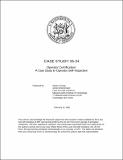| dc.description.abstract | Operator certification is the process where production workers are trained, authorized, and given the necessary resources to inspect their own work. This case study evaluated operator certification systems in the manufacturing process at three major aerospace companies during the
Spring of 1995. Within the manufacturing area, operator certification was observed in such operations as high volume machining operations, certain processing operations-such as leak testing, balancing, and painting-and production of high volume detail parts. This case study was initiated as a result of the data from the human resources focus group’s survey in 1994. Prof. Jan Klein found that the airframe sector had a significantly lower
percentage of plants where production workers perform inspection tasks as compared to the engine and electronics sectors. While operator certification is not a new concept, it appeared to be a best practice within two of the three sectors of the aerospace industry. This case study was performed to investigate these high potential payoffs. | en_US |
